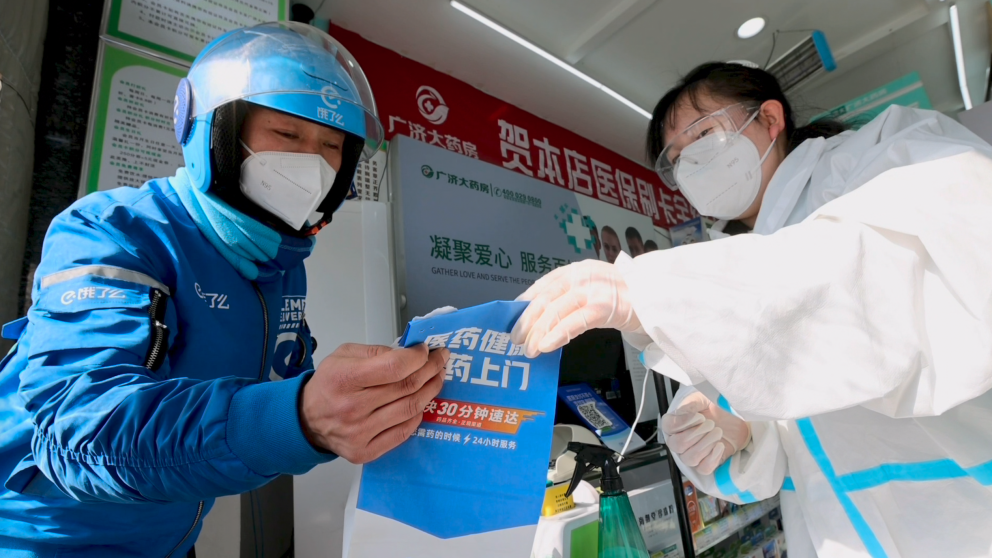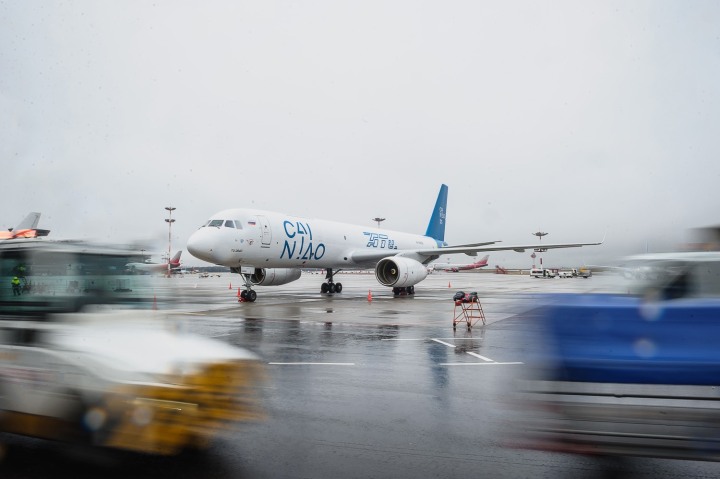
Photo credit: Alibaba Group
Alibaba Group on Thursday reported earnings for the quarter ending June 30. Shortly after, Alibaba Chairman and CEO Daniel Zhang addressed investors on a conference call. Below are his comments:
Hello everyone. Thank you for joining our earnings call today.
We have delivered stable results after overcoming challenges in an extraordinary quarter. According to data released by the National Bureau of Statistics, China’s GDP grew by 0.4% in the last quarter, the lowest since the outbreak of the pandemic.
Retail sales decreased year-over-year in April and May due to resurgence of Covid-19 in Shanghai and other major cities, and has slowly recovered in June. Despite the soft economic conditions, we managed to deliver stable revenues and narrowed losses in several strategic businesses by improving operating efficiency.
In response to these external macro uncertainties, our guiding principles have been — as I wrote in my annual letter to shareholders — “be confident, be flexible and be ourselves.”
We are confident about the future of the digital economy. We are confident that digitalization as a universal trend across industries and markets will constitute an increasing percentage of the social economy.
“Be flexible” means actively adapting to the external challenges and finding our own path through the social and economic development cycles.
“Be ourselves” means focusing on our three core strategies, namely Consumption, Cloud and Globalization, and delivering high-quality growth with ESG as the foundation for reaching our vision of becoming a good company that lasts 102 years.
Going forward, we will focus on growing our wallet share in different consumer segments, instead of pursuing further absolute increase in our user base in China
More specifically, we are executing our three core strategies and delivering high-quality growth in the highly-uncertain environment today in the following ways.
On Consumption, we are leveraging our strength, which is our digital commerce infrastructure built on comprehensive fulfillment capabilities to serve diverse consumer segments and focus on consumption categories with higher certainty of demand. We already achieved the target of 1 billion annual active consumers in China during the last fiscal year.
Going forward, we will focus on growing our wallet share in different consumer segments instead of pursuing further absolute increase in our user base in China.
On Cloud, we will focus on enhancing our competitive advantage, which is our proprietary technologies and serving the sectors and customers that represent the future in social and industrial development.
On Globalization, we will focus on the markets with favorable economic development prospects in the next 5-10 years, investing in localized capabilities and building infrastructure in logistics and cloud.
Signs of Recovery
During the past quarter, Taobao and Tmall’s GMV experienced a mid-single-digit percentage decline on a year-over-year basis. We saw signs of recovery since June as logistics and the supply chain situation gradually improved after COVID-restrictions eased.
Over the past few months, daily active users and consumption-related pageviews of our Taobao app remained relatively stable despite the market volatility. Consumers with the highest spending power demonstrated strong loyalty to our platforms.
In the twelve months ended June 30th, 2022, more than 123 million annual active consumers each spent over RMB10,000 ($1,480.9) on Taobao and Tmall, representing a retention rate of approximately 98% compared to the prior twelve-month period, which was on par with the data as of the end of March.
88VIP members, our most important premium users, continued to grow at a healthy rate to 25 million by quarter end, with annual average spending of over RMB57,000 per member.
Starting in July, we are seeing a gradual recovery of business performance compared to June, especially in the relatively more impacted categories in the past few months such as fashion and electronics.
As we continued to grow our location-based digital commerce infrastructure in recent years, our diversified business models are showing complementary benefits.
For example, while certain discretionary categories on Taobao and Tmall were negatively impacted by the pandemic, our Freshippo and Ele.me businesses captured growth opportunities in food and grocery, fulfilling family needs for daily necessities.
In the past quarter, Freshippo’s GMV grew over 30% year-over-year and Eleme’s GMV of non-restaurant deliveries increased by over 50% year-over-year.

Competitive Strategy
We are aware that the overall growth of Taobao and Tmall’s GMV was below China’s retail sales growth in the past quarter, as we experienced increasingly fierce competition among various formats of e-commerce. From Alibaba’s perspective, I want to be clear about our competitive strategy.
On the consumer side, we will continue to strengthen Taobao app’s consumer mindshare as the main shopping destination, with diversified experience of digital commerce formats.
In a highly uncertain market environment, we will focus on serving the consumer groups with higher spending power, while providing a matrix of consumer offerings with diversified value propositions for different user segments (such as Taobao Deals, Taocaicai, Idle Fish, Freshippo, etc).
On the merchant side, we will continue to enhance our tools and services to strengthen our marketplaces’ position as the main platform for sustainable business operations. In addition, we will also take advantage of our quality of operations in China commerce: Our current scale is much bigger than our peers’, and more importantly, our advantage in profitability is even larger.
Therefore, we will make the best use of our capital reserves by investing in building consumer mindshare, user experience and core capabilities in key areas such as logistics and after-sales services and execute on these as our long-term strategies.
During the COVID resurgence in major cities such as Shanghai and Beijing in April and May, the digitalized network integrating intracity commerce and fulfillment has become a new infrastructure in modern urban life.
During the quarter, Eleme’s restaurant delivery volumes were negatively impacted by COVID restrictions. However, Eleme’s GMV during the quarter was less impacted as order volumes for non-restaurant deliveries such as food, grocery and medicines increased rapidly, which also contributed much higher basket size than restaurant deliveries.
As COVID impacts eased, Eleme’s operation has been recovering and its GMV resumed positive growth year-over-year in June. At the same time, while Freshippo and Sun Art experienced negative impacts in offline sales during the pandemic this quarter, they played an important role in providing essential supply support for local communities leveraging their digital sales and intracity fulfillment capabilities. The percentage of online sales for Freshippo and Sun Art during the quarter reached 68% and 36%, respectively.
Eleme’s unit economics turned positive this quarter mainly due to increased average order value as well as its ongoing focus in optimizing user acquisition spending and reducing delivery cost per order.
Looking forward, Eleme will continue to focus on its city strategy and strengthen its customer mindset from restaurant delivery to everything delivery, while improving its operating efficiency. We are confident about narrowing Eleme’s operating losses during this fiscal year.
Amap, another important business in our local consumer services segment, continued to grow towards a destination-bound services discovery & transaction platform.
In June, the number of average daily active users of Amap reached a new high of over 120 million, driven by easing COVID impacts and ongoing enrichments of local contents and services on the platform.

Global Outlook
Our international commerce retail businesses in Southeast Asia and Europe experienced a decline due to changes in the European Union’s VAT rules, depreciation of local currencies, Russia-Ukraine conflict and normalizing offline activities after COVID restrictions lifted in the regions.
In spite of these challenges, we still see great opportunities in the international market under the general trend of digitalization.
Today we have already established a certain foothold in the international market. On a combined basis, our international commerce retail businesses have an annualized GMV of over $50 billion.
Going forward, we will continue to focus on growing both the cross-border model and local commerce model and building logistics as a core capability.
Despite the near-term sales fluctuations, we will continue to focus on building the cross-border logistics network from China to Europe and the local logistics network in Southeast Asia. We believe the establishment of these infrastructure will bring long-term value.
Our Cloud revenues delivered 10% growth year-over-year during the quarter. The slowdown in revenue growth was a result of multiple factors, including slowing macroeconomic activities, decline in revenue from the top Internet customer, softening demand from China Internet customers and delays in parts of our hybrid cloud projects due to the impacts of the COVID resurgence.
Looking forward amidst the uncertainties in economic outlook and Internet industry deceleration, our cloud business will continue to focus on the following areas: 1) building proprietary technology capabilities in key areas such as computing, big data and artificial intelligence; 2) capturing the growth opportunities in industrial internet by identifying the “sunrise industries and customers”; and 3) strengthening our cloud’s data security capabilities and defending our bottom line.
During uncertain times, we believe the best investment is to invest in ourselves, to build our core capabilities and to continue self improvement
We have already seen some progress in these strategies. Contribution of cloud revenue from non-Internet industries was 53% in the past quarter, up more than 5% compared to the same quarter last year.
During the same period, more and more enterprise customers are adopting DingTalk to work or study as COVID-restrictions increased across the country.
DingTalk will continue to strengthen its position as a digital workplace collaboration platform by further improving the capabilities and increasing user penetration of its core office products, such as document collaboration and virtual conferencing.
In addition, Dingtalk will enhance its low-code application development platform, to encourage the development and usage of more diversified digital business applications on Dingtalk.
As part of our ESG strategy, we are committed to corporate governance excellence and diversity at the board level. Earlier today, we announced two new independent director appointments.
Ms Irene Lee and Mr Albert Ng are both respected business leaders with invaluable global insights as well as China experience. I believe their participation will add great value to our board.
In addition, Mr. Tung Chee Hwa, one of our independent directors, will not seek re-election after his current term expires in September. I would like to express our most sincere gratitude to Mr. Tung for his invaluable contribution to Alibaba over the years.
A Way Forward
Finally, I would like to talk about our thoughts on the path forward in the current microenvironment.
The external uncertainties, including but not limited to international geopolitical dynamics, COVID resurgence, and China’s macroeconomic policies and social trends, are beyond what we as a company can influence.
The only thing we can do at this moment is to focus on improving ourselves.
For example, as I mentioned earlier, we have made meaningful progress during the quarter in narrowing operating losses for several business units, such as Taobao Deals, Taocaicai, Freshippo, Eleme, Lazada and Youku, through operating efficiency enhancement and cost optimization.
We are still in the process of improving the quality of operation across the organization. We are confident this is a result that we can deliver with certainty through our own efforts in a highly uncertain environment.
Despite the challenges we are facing, our overall financial position remains healthy with strong free cash flow and net cash reserves, which is our biggest advantage. During uncertain times, we believe the best investment is to invest in ourselves, to build our core capabilities and to continue self-improvement.
We will continue to focus on serving our high-quality consumers, building high-quality infrastructure for digital commerce and driving high-quality technology innovations.
We believe these will lay the foundation for our healthy and sustainable development over the long term.




